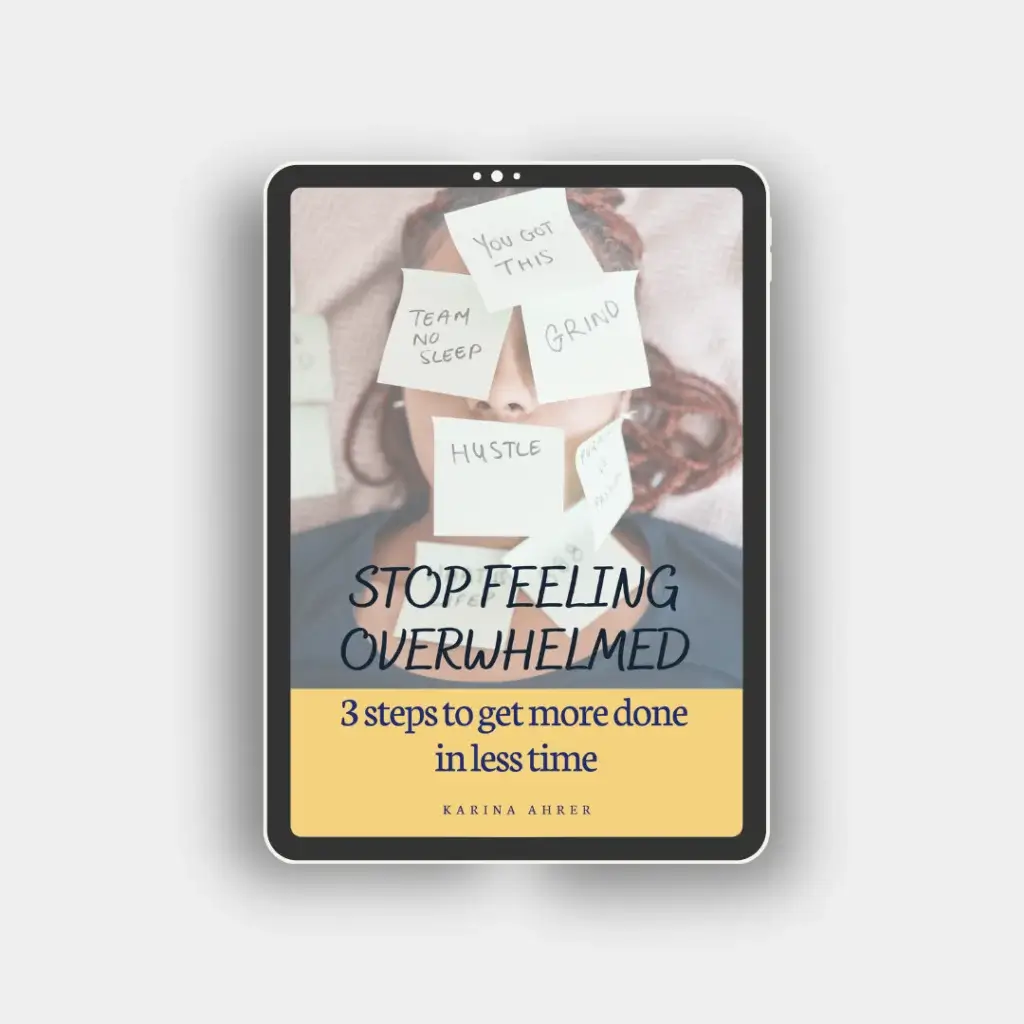The hustle culture mindset is counterproductive for introverts
Everyone is talking about time management, and there are so many tools and hacks out there that it’s overwhelming.
Each of these articles makes sense based on the writer’s experience, but productivity is unique to each person.
What I’m talking about in my productivity course is based on my experiences and tools that worked for me. That’s why I tell my customers to try them out and find the ones that work for them.
You choose what tools are useful depending on what you currently need and focus on.
For writing my master’s thesis, taking small steps daily based on a plan of action was important. I did weekly reviews and planning and focused on the most important 20%.
Because I was working alone, I couldn’t delegate, and I didn’t have to set boundaries.
Today, I want to discuss specific strategies for introverts. We can be really good at focusing, but the environment needs to support it.
While extroverts need bustling open-plan offices or coffee shops, introverts need to manage their energy more effectively in this loud world.
Leverage your natural focus
Introverts love to go deep and have uninterrupted time to focus. We love working alone on one task.
We have a natural ability to focus well.
Use this to your advantage!
We love the quiet. We get into the flow state and can work on a problem or task for hours without noticing time passing by.
That’s what I love about math and programming: get me a quiet room and a logical problem to solve, and I’ll be in flow immediately.
Leverage your natural skill of focus.
Everyone is distracted by phones ringing, ads, emails…
And you’re in a flow state getting things done. It’s a huge advantage.
Preparing, preparing, preparing
I love preparing and planning. It gives me a feeling of control.
Preparing makes every step out of the comfort zone easier and every time blocked more productive.
I’m preparing myself for every networking event. They are out of my comfort zone, but I’m taking the steps to improve and meet like-minded people.
I’m checking the program, googling the speakers and the organization, and thinking of questions I can start conversations with.
This doesn’t just help me have better conversations; I’m also less nervous, and the step out of my comfort zone doesn’t look as big.
You can do the same preparations for every step you’re afraid of.
- If you want to talk more in meetings: prepare questions!
- If you want to talk with colleagues at lunch break: prepare topics!
- If you want to get more done on Saturdays: prepare your environment!
- If you want to have fun on the dance floor: prepare dancing steps!
The love of preparing and planning helped me have better focus time blocks on the weekends.
I’m:
- Muting my phone
- Preparing snacks and drinks
- Preparing to-dos
And then every week I’m reviewing what went well and didn’t go well, and I’m improving next week. I plan based on that feedback.
Batch social interaction into 1 time slot
Social interactions are draining the energy of introverts faster than of extroverts. We need a lot of energy to think, listen, and talk.
Preparing can decrease the drainage of energy because you have to think less during the conversation.
This week I have 3 social events in the evenings, and I prepared myself to have high energy (alone time before, vitamins…). I’m trying to decrease the social interactions at work by focusing on the tasks and turning on music.
I couldn’t batch those into 1 time slot, but I suggest doing that with meetings or calls.
Social interactions are depleting our energies really fast. Make 1 time slot every day or week when you’re taking meetings and doing calls (if you have the choice).
At university, I usually had weekly feedback meetings with the tutors, and right after and before was the time to work with my project partner. I batched the time working together to 1–2 days, and the rest we did alone at home.
It worked really well. We discussed the feedback and decided on the next to-dos, coordinated, and then worked on our own.
Batching social interactions helps you suffer less mental fatigue in total. Instead of suffering daily after every meeting, you’re only suffering once after the day of socializing.
Set boundaries
Setting boundaries is not only useful for social interactions but also for teamwork and at home.
You can decline tasks that are not important to your project. Decline or delegate meetings that are a waste of your time and energy.
You don’t have to be everywhere.
Prioritize deep-focus time blocks.
Prioritize what matters and say no to the rest.
Additional social tasks like organizing after-work, birthday presents… It’s nice, but it’s decreasing your energy.
Delegate!
Being kind doesn’t mean saying yes to everything. You can kindly decline if you need time for yourself or your passion projects.
I know introverts are predestined to be people-pleasers; I was one of them. But it just increased my stress level and to-do list.
Instead of saying yes to everything, set boundaries for yourself and be reliable at what is actually important.
Volunteering at a student organization showed me what is important in a teammate:
- reliability on doing the job they say they do
- actually doing it instead of just talking about ideas
- not being everywhere but at important events for their role
I don’t mind if they skip a board meeting because they don’t have the energy or time, but they do their job.
Another important boundary introverts need to set is mental boundaries.
We think and worry about everything and everyone.
Sometimes I’m totally stuck in my head that I’m checked out from the present. I’m just not here mentally.
And that doesn’t help my productivity.
My pro-tip: journal. Write everything down!
Leverage digitalization
Digitalization gave us a lot of great opportunities to improve our productivity. But usually, we use it to procrastinate or waste time with useless games.
Take advantage of digital tools like emails and messaging. If you don’t want to, you could never talk to a person ever again. Messaging and emails are enough. (but you don’t have to be so radical.)
- Use emails instead of meetings.
- Use project management tools to interact with your colleagues and boss about to-dos.
- Do home office (if possible) or work as a freelancer from home!
Online writers are making good money without picking up the phone ever. You don’t need to be available every minute.
Working alone can be boring so you shouldn’t remove all face-to-face interaction but check your energy balance.
I’m exhausted from working in the office all day, 5 days a week in a kinda open office (there are some niches). Less focused work. More interaction. More energy consumption.
That’s why I’m writing this in the morning. During my quiet time before work depletes my energy.
In the end
In the end, introverts care a lot. We are empaths and I think that’s the biggest issue that keeps us from being productive.
We are really good at focused work, but we need a quiet environment to reach our full potential.
This includes learning to say no. And it’s not just about being productive but about self-care.
Less Stress. More Time. Less Overwhelmed!
Get your free copy of my 3 steps!

Get daily insights, motivation, and inspiration:
If you are as addicted as I am to reading books, check out my favorite books!




